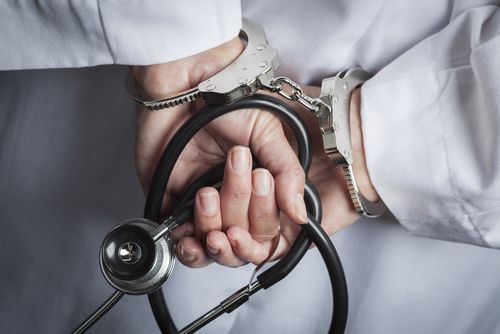$190M Malpractice Settlement Involves No Criminal Charges: Is More Money The Answer To Doctors' Abuse?

During Dr. Nikita A. Levy’s 25-year tenure as a Johns Hopkins gynecologist, he photographed and videotaped more than 8,000 women during pelvic exams and now the hospital is paying for it. No more than 10 days after the police discovered the tapes, Levy committed suicide and left Johns Hopkins Health System to pay $190M on behalf of his patients in court. But is financial consequence enough for the crimes doctors commit?
"All of these women were brutalized by this," said Jonathan Schochor, the attorney representing the women who were victims in the act, according to The Associated Press. "Some of these women needed counseling, they were sleepless, they were dysfunctional in the workplace, they were dysfunctional at home, they were dysfunctional with their mates. This breach of trust, this betrayal — this is how they felt."
When Levy’s co-worker reported her suspicions to authorities in February 2013, he was forced to turn over his pen-like camera and was fired. Investigators uncovered roughly 1,200 videos and 140 images of his patients’ sex organs stored in his home computers. Lawyers said it didn’t matter that the patients’ faces weren’t visible in the images; thousands of women who had Levy as their gynecologist were traumatized by the discovery.
Hopkins said their malpractice insurance will cover the finances, which "properly balances the concerns of thousands of plaintiffs with obligations the Health System has to provide ongoing and superior care to the community."
But is financial compensation enough? One cannot help but wonder what kind of criminal discipline Levy would’ve experienced had he not wrapped his head in a plastic bag with a hose connected to a helium tank and killed himself. According the Principles of Medical Ethics, in the American Medical Association (AMA), “[a] physician shall respect the law.”
But time and again the public watches doctors commit crimes a common law man would never get away with, which begs the question: Are they treated above the law because of their medical skill set?
Take New York Gynecologist Allan Zarkin, for example. Zarkin carved his initials into a woman’s abdomen after she delivered her baby by Cesarean section, and after he surrendered his medical license, he received five years of probation and was barred from applying for a medical license for five years. Zarkin basically received a five-year time out and slap on the wrist, whereas a likeness crime for a non-MD would not have reflected the same grace.
According to Health Matrix: Journal of Law-Medicine, there is a calculation that can determine the risk doctors will incur when they commit a crime, with factors including patient involvement, sex, alcohol, drugs, and negligence among others. More than 50 percent of suspensions and restrictions directly involved patients, and 40.4 percent of those crimes were sex-related, while 22.4 percent were alcohol-related.
However, the emotional and mental toll the crime inflicts upon a patient is incalculable. According to a Gallup Health and Healthcare Survey, 70 percent of Americans are confident their doctor is doing right by his practice. That is a lot of trust to put into people who aren’t penalized in court the same way their patients are. It's not just in America either. The General Medical Council released the number of criminal records held by practicing doctors in response to a Freedom of Information request, which revealed after 856 convictions, there were still 761 doctors practicing in October 2013.
One of Levy’s patients, Myra James, had been going to him for her annual exams for 20 years and hasn’t been able to bring herself to a gynecologist since the misconduct became public. Reflecting back on the doctor’s appointments, she said she found it strange he conducted examinations without a nurse present.
"He was cold, and I was kind of scared of him. His bedside manner — he didn't have any," James said. "But all my doctors were at Hopkins. I've had two surgeries there, my primary doctor is there. I was used to going there for everything."
Levy had been working for the Johns Hopkins Health System since 1988 and was practicing at Hopkins Eat Baltimore Medical Center at the time of his allegations. Throughout his career, he had seen an estimate 12,600 patients.
Last year, Hopkins Health System sent apology letters out to his entire patient list and encouraged them to seek care with other specialists within their system and assured them the authorities confirmed the images did not appear to have been shared with anyone. They also issued a statement in October 2013 saying they were working to settle the claims in a way that "helps our patients and colleagues move forward."
Hundreds were so traumatized by the events that they just dropped out of the medical system altogether, while others stopped sending their children to the doctors according to Schochor.
"I can't bring myself to go back," James said. "You're lying there, exposed. It's violating and it's horrible, and my trust is gone. Period."
Levy’s suicide left everyone with questions along with one of the largest settlements involving sexual misconduct settlements committed by a physician, in United States history.
"It is our hope that this settlement—and findings by law enforcement that images were not shared—helps those affected achieve a measure of closure," the hospital statement said, adding that "one individual does not define Johns Hopkins."



























